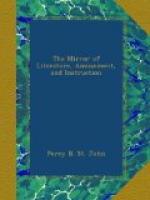He had the greatest dislike to be asked a question, which he did not consider important, and used to say, “I have three miseries—smoke, flies, and to be asked a foolish question.”
His memory was one of the most remarkable. He has often requested me to copy for him (from some library) a passage, which I should find in such a page of such a book; and appeared as if he never forgot any thing with which he was once acquainted.
His conversation was peculiarly eloquent and impressive, such as to render it evident that he had not been over-rated as an orator, when in the days of his glory, he was the admiration of his country. I remember his once discoursing to me of language, and saying, “in every language, there are three things to be noticed,—verbs, substantives, and the particles; the verbs,” holding out his hand, “are as the bones of these fingers; the substantives, the flesh and blood; but the particles are the sinews, without which the fingers could not move.”
“There are,” said he to me, once, “three kinds of writing—diplomatic, in which you do not come to a point, but write artfully, and not to show what you mean; attorney, in which you are brief; and enlarged, in which you spread and stretch your thoughts.”
I have said that his cottage, (built by himself,) near the Regent’s Park, was very beautiful. I remember his showing me a letter to a friend, in which were the following passages:—After alluding to some pecuniary difficulties, he says, “I can easily undergo all privations, but my dwelling is always my workshop, and often my prison, and ought not to distress me with the appearance of misery, and I confess, in this respect, I cannot be acquitted of extravagance.”




